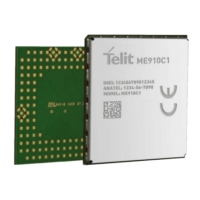AT Commands Reference Guide
80529ST10815A Rev.2– 2017-09-14
ReproductionforbiddenwithoutTelitCommunicationsS.p.A.writtenauthorization‐AllRightsReserved page168of233
#SSENDUDP – send UDP data to a specific remote host
AT#SSENDUDP=1,<RemIP1>,<RemPort1>
>response to first host
OK
SRING: 1 // UDP data from a remote host available
AT#SI=1
#SI: 1,22,23,24,0 // 24 bytes to read
OK
AT#SRECV=1,24
#SRECV:1,24
message from second host
OK
AT#SS=1
#SS: 1,2,<LocIP>,<LocPort>,<RemIP2>,<RemPort2>
OK
Remote host has changed, we want to send a reponse:
AT#SSENDUDP=1,<RemIP2>,<RemPort2>
>response to second host
OK
Send UDP data to a specific remote host extended - #SSENDUDPEXT
#SSENDUDPEXT – send UDP data to a specific remote host extended
AT#SSENDUDPEXT=
<connId>,
<bytestosend>,
<remoteIP>,
<remotePort>
This command permits, while the module is in command mode, to send data over
UDP to a specific remote host including all possible octets(from 0x00 to 0xFF)
As indicated about #SSENDUDP:
UDP socket has to be previously opened through #SLUDP / #SA, then we are
able to send data to different remote hosts.
Like #SSENDEXT, the device responds with the prompt ‘> ‘ and waits for the
data to send, operation is automatically completed when <bytestosend> have been
sent.
Parameters:
<connId> - socket connection identifier 1..6
<bytestosend> - number of bytes to be sent 1-1500
<remoteIP> - IP address of the remote host in dotted decimal notation, string
type: “xxx.xxx.xxx.xxx”
<remotePort> - remote host port 1..65535
AT#SSENDUDPEXT=?
Test command reports the supported range of values for parameters
<connId>,<bytestosend>,<remoteIP> and <remotePort>
Send Data in Command Mode - #SSEND

